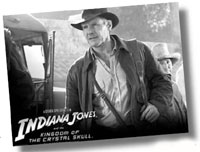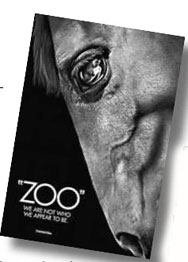Reviews
Films
Indiana Jones and the Kingdom of the Crystal Skull

Directed by Steven Spielberg, starring Harrison Ford, Cate Blanchett, Karen Allen
Steven Spielberg and his producer-collaborator George Lucas are once again in nostalgic, mystical Saturday-morning-adventure mode.
The picture addresses the Cold War in two contrasted stages. In the first, the slam-bam action one, Indy and British sidekick Mac are taken prisoner by a party of ruthless KGB men disguised as U.S. soldiers in the Nevada desert.
The movie then quits the real world as mysticism, nostalgia and sentiment take over. On Indy's desk are photographs of his father (Sean Connery) and his mentor, Dr Marcus Brody (Denholm Elliott), now dead. He is a man alone, in need of, and soon to get back with, the love of his life, Marion Ravenwood (Karen Allen), the feisty Hawksian heroine of Lost Ark, and then to discover a son of whom he never knew.
The film is old-fashioned, self-referential fun, in which ancient mythologies are stirred in with newly created ones like the fetishistic fedora, bullwhip and leather jacket that make up Indy's ritual regalia. Everything is accompanied by John Williams's triumphal music and it has a confidence lacking in its imitators like The Da Vinci Code and National Treasure.
The franchise is, like Coca- Cola, a canny confection and, like that dubious drink, it's surrounded by such secrecy that the final credits list a "Confidentiality Co-ordinator".
Indiana Jones as embodied by Harrison Ford inspires an affection that Bond and the supposedly more complex, self-doubting superheroes don't. In an odd way, he embodies old- fashioned decency and a sense of being at one with the world and its history.
Zoo
Directed by Robinson Devor, starring John Paulsen, Ken Kreps

What a deeply strange piece of work this is, a movie that casts an eerie spell, at least partly because of its occult manner of withholding the truth. That title may sound innocuous. It is anything but. Zoo is short for "zoophile", someone who is sexually attracted to animals, in this case horses.
This can only be described as a docu-drama meditation, an insistently elusive cinematic poem that takes the most brutal and shocking and bizarre subject and turns it into something that - though hardly subtle exactly - is intriguing and indirect. It shies away from the subject (no pun intended) and prefers instead to intuit the moods and psychic weather that crackles overhead, while this awful transgression takes place on the ground: largely unseen and unnoticed by Devor's camera.
Zoo is based on a true incident that took place in 2005. An engineer in his mid-40s was anonymously dumped at a hospital emergency room in Washington state, dying later of a perforated colon. A police investigation led to a remote farmstead, and officers discovered horrible videotape evidence of equine bestiality, which was, remarkably, then legal in that state, though the ensuing furore soon changed matters.
Perhaps most importantly, it is a film about the Internet (because of course the zoos congregated via the web) and about how the net has created new modes of communication, new forms of identity, new private communities and new shared activities that were unthinkable before. It gives rise to the same debate that is familiar in relation to exploitative pornography: awful thoughts that might once have remained fleeting, private, unexamined, and to all intents and purposes non-existent, can now be acted upon.
Some may feel that a film that circles round its subject so enigmatically is wilfully obtuse, but I found it fascinating. Devor uses the possibilities of cinema to circumvent revulsion and shed light on the farthest reaches of psychology and technology. The Guardian
(China Daily 06/04/2008 page20)














